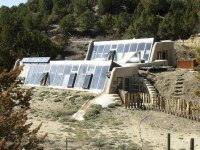Bummer.....
Source: Fairbanks Daily News-Miner (AK)
POLICE, DEA GRANTED BROAD ACCESS TO FAIRBANKS RESIDENTS' UTILITY RECORDS
FAIRBANKS - A judge or grand jury is not needed to force a utility cooperative to give police utility records of suspected pot growers, according to a 9th U.S. Circuit Court of Appeals opinion reached Tuesday in a case involving Golden Valley Electric Association and the U.S. Drug Enforcement Administration.
In late 2010, the DEA served the Fairbanks electricity co-op with a subpoena demanding the power consumption and payment records for three customers. GVEA resisted, citing a policy of protecting customers' records.
U.S. District Court Judge Ralph Beistline sided with the DEA's authority to get the information with a subpoena, based on the DEA's authority under the Comprehensive Drug Abuse Prevention and Control Act of 1970.
In GVEA's appeal to the 9th Circuit, Washington attorney Joe Evans argued the utility should be able to invoke its customers' Fourth Amendment protection from search and seizure to refuse the DEA request without a probable cause search warrant from a judge.
In an unanimous published opinion, the three-judge panel of appeals judges disagreed.
"A customer ordinarily lacks a reasonable expectation of privacy in an item," like a business record, "in which he has no possessory or ownership interest," wrote Judge William Fletcher, citing a 2000 case involving motel registration records.
The court also agreed with the DEA that electricity records were relevant to a drug investigation because higher-than-usual electricity use can be a sign of lamps used to grow marijuana. The court also ruled that the request for the records of three customers was not "overly broad."
The names of the GVEA customers are not given in the court opinion. The utility was forced to comply the subpoena while the case was being appealed because both district and appeals courts refused to delay the subpoena.
The only remaining venue to appeal the decision is the U.S. Supreme Court. Reached Wednesday evening, Evans said GVEA has not yet decided whether to ask the Supreme Court to take the case. The high court takes very few cases and would be less likely to take this one because it takes mostly cases where appeals courts opinions go against precedent, he said. Most lower courts have found that utility records do not get Fourth Amendment protections, as the 9th Circuit did in this case.

Source: Fairbanks Daily News-Miner (AK)
POLICE, DEA GRANTED BROAD ACCESS TO FAIRBANKS RESIDENTS' UTILITY RECORDS
FAIRBANKS - A judge or grand jury is not needed to force a utility cooperative to give police utility records of suspected pot growers, according to a 9th U.S. Circuit Court of Appeals opinion reached Tuesday in a case involving Golden Valley Electric Association and the U.S. Drug Enforcement Administration.
In late 2010, the DEA served the Fairbanks electricity co-op with a subpoena demanding the power consumption and payment records for three customers. GVEA resisted, citing a policy of protecting customers' records.
U.S. District Court Judge Ralph Beistline sided with the DEA's authority to get the information with a subpoena, based on the DEA's authority under the Comprehensive Drug Abuse Prevention and Control Act of 1970.
In GVEA's appeal to the 9th Circuit, Washington attorney Joe Evans argued the utility should be able to invoke its customers' Fourth Amendment protection from search and seizure to refuse the DEA request without a probable cause search warrant from a judge.
In an unanimous published opinion, the three-judge panel of appeals judges disagreed.
"A customer ordinarily lacks a reasonable expectation of privacy in an item," like a business record, "in which he has no possessory or ownership interest," wrote Judge William Fletcher, citing a 2000 case involving motel registration records.
The court also agreed with the DEA that electricity records were relevant to a drug investigation because higher-than-usual electricity use can be a sign of lamps used to grow marijuana. The court also ruled that the request for the records of three customers was not "overly broad."
The names of the GVEA customers are not given in the court opinion. The utility was forced to comply the subpoena while the case was being appealed because both district and appeals courts refused to delay the subpoena.
The only remaining venue to appeal the decision is the U.S. Supreme Court. Reached Wednesday evening, Evans said GVEA has not yet decided whether to ask the Supreme Court to take the case. The high court takes very few cases and would be less likely to take this one because it takes mostly cases where appeals courts opinions go against precedent, he said. Most lower courts have found that utility records do not get Fourth Amendment protections, as the 9th Circuit did in this case.








